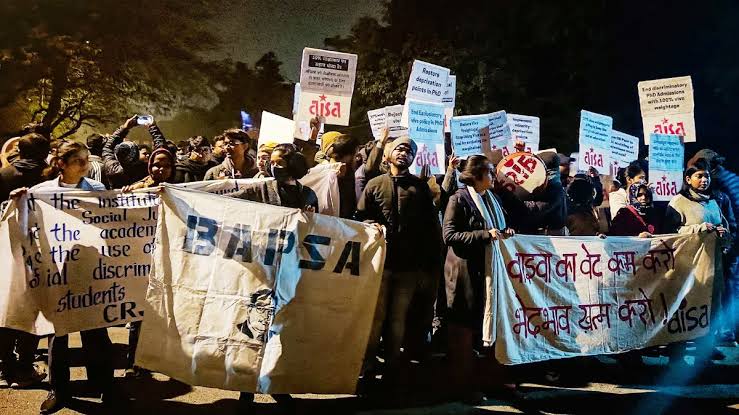
Jawaharlal Nehru University (JNU) has recently issued a new manual, titled “Rules of Discipline and Proper Conduct of Students,” sparking concerns and criticism from diverse students and activists.
As per the manual, JNU students may be subject to fines of up to Rs 20,000 for engaging in any form of protest, including hunger strikes and dharnas, within a 100-meter radius of academic and administrative buildings.
Additionally, fines up to Rs 10,000 could be imposed for raising “anti-national” slogans.
Released by the Chief Proctor’s office on November 24th, the manual has been approved by the University’s Executive Council, the highest decision-making body. It outlines various categories of misconduct and punishments, including the possibility of expulsion from the University.
The Jawaharlal Nehru University Student’s Union (JNUSU) has strongly opposed the manual, calling it an attempt to “stifle dissent” on campus.
The union demands an immediate revocation of the new regulations, arguing that they threaten the vibrant campus culture that has defined JNU for decades.
“The stringent measures outlined in the manual are aimed at stifling the vibrant campus culture that has defined JNU for decades. Such excessive regulations are intended to discourage open discussions, dissent, and intellectual exploration, which are fundamental to the spirit of our university,” JNUSU said.
The statement read that the new manual of the Chief Proctor has been released by the JNU Administration without any discussion or deliberation with the university’s stakeholders.
“The manual grants unprecedented powers to the Chief Proctor, compromising the autonomy of the student community. Further, the JNU Chief Proctor Manual lacks clarity on several crucial aspects, leaving room for misinterpretation and arbitrary implementation. Such ambiguous rules can lead to unfair and discriminatory practices, jeopardizing the rights of individual students,” JNUSU alleged.
Talking to Maktoob, Aishe Ghosh, JNUSU President, said that the new manual brought by the CPO is nothing but a step ahead to criminalise dissent.
“Firstly, the document was passed in the Executive Committee meeting which doesn’t have any student representatives and without even any discussion in the Academic council which should deliberate on policies affecting student community.”
She went on to say: “Secondly, the new ‘Fine Raj’ has become a way for Shanti Shree led JNU Administration to fill their pockets out of the pain of the students. Students are at the receiving end of pathetic and worsening infrastructure and academic qualities and the recent days students were left with no option but the protest against the arbitrary anti-student policies passed by the administration. Finally, the fines are also levied in a way that overall dissent can be curbed and a culture being built were no protest happen even if grave injustice is happening. The VC who claimed recently that PM Modi is the tallest spokesperson of democracy is exactly following his footsteps to kill the democratic culture of our University. JNU has been known to stand out as a University to inculcate the idea of debate across ideas, which will be at stake after the implementation of this manual.” said Ghosh.
The manual outlines the procedures for conducting inquiries by the Proctor’s office and specifies punishments for various offenses, categorised into three categories. The manual lists 28 types of misconduct, including gambling, printing, circulating or pasting posters/pamphlets (text or picture) carrying derogatory religious, communal, casteist or “anti-national” remarks, unauthorized hostel room occupation, and forgery.
A student could face expulsion if they receive five or more punishments throughout their entire academic tenure, as stated in the document.
Ananya Kumar, the president of SFI JNU unit, told Maktoob that the content of the manual is authoritarian and anti – student which attempts to supress all forms of political and cultural expression on campus.
“Even something as harmless as class campaigning, used by both individuals and organizations to spread awareness, inform about events, or conduct surveys is penalised. This appears to be a cheap attempt to salvage the government’s and administration’s image, both determined to undermine JNU, eradicate its progressive culture, and compromise the quality of education students once received,” he added further.
Kumar while talking about the content of the manual said that it represents an ideal university that the BJP or RSS aims to cultivate—a university that refrains from asking questions, lacks a culture of protests, and lacks essential elements that a university is supposed to have: rationality, skepticism, and encouragement of debates and dissents. All these aspects are targeted through the CPO manual, and that is why it should be condemned.
“Another point to be noted is that the manual has stated that anything deemed “anti-national” by the definition of the administration or government is also liable to be penalized, potentially resulting in students being rusticated. Therefore, even a critique of government policies or religious polarization, or anything that the government is doing to win elections, becomes liable to be penalized or fined,” he said.
The Students Islamic Organisation of India said it strongly condemns JNU’s recent prohibition on protests.
“This suppressive measure adds to the perceived autocracy and violence against students and minorities. The administration must address past failures, like Najeeb’s case, instead of stifling voices. The campus is vital for nurturing responsible citizens, and restricting student voices hints at potential anarchy. SIO demands the restoration of space for students’ expressions,” it stated.



